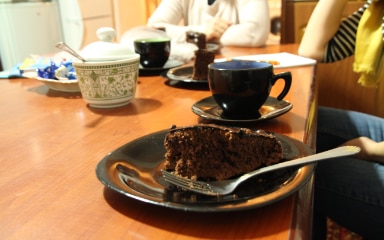
The young Armenian woman Anna Kamay lives abroad but regularly visits her homeland. In Yerevan, the life stories and business projects of Syrian people, some with Armenian roots, caught her attention. Who are they, and how do they get along in Armenia? Anna documented their lives through the photo exhibition “The Newcomers: Syrians in Armenia”, funded by Switzerland. We met two of Anna’s many heroes.
Ilona’s journey
Ilona Yan, over 40, is a mother of four children. She received us in her modest apartment in Yerevan. Ilona has been a refugee for more than half of her life. First, she fled from Baku, Azerbaijan to Russia with her family, returned back to Baku again and then came to Yerevan in the early 1990ies. „After talking to my close friend on the phone, I was convinced that Armenia was my way out, the light at the end of the tunnel,” Ilona says. Relatives from Hoktemberyan, a city close to the capital, provided living space to their newcomer nieces, Ilona and her sister. Ilona got admitted to the Polytechnic University in Yerevan, studied economy and planning and graduated with success.
In Yerevan, Ilona’s sister fell in love with a Syrian man, got married and moved to Syria. When the sister expected a baby, Ilona decided to visit her. In Syria, she met her future husband, the father of her four adorable children. Sadly, she lost him in the Syrian war. Three of the children are now with Ilona in Armenia, whereas her elder son is in Beirut with his aunt. „The biggest dream of mine was to help my children in getting good education! After all, not being able to accompany my elder son and daughter to Aleppo in their final year of studies, I sent them all on their own.” Both of the children passed the exams, but as the situation got violent in Syria, her eldest son could not come back home, so he fled the country with his aunt’s family to Beirut. In Lebanon, the boy who once dreamed of becoming a lawyer is now working as a welder. „The most important thing is that he is safe and sound,“ Ilona adds.


